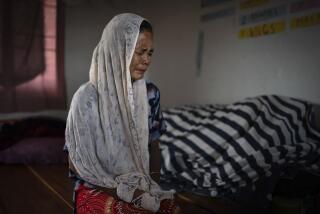Sikh Violence in Agriculture-Rich Punjab State Takes Its Toll as Farm Laborers Flee
- Share via
LUDHIANA, India — Fear of more killing here in troubled Punjab has brought on an acute farm-labor shortage just as the season begins for transplanting rice.
Agriculture officials are concerned that the shortage will not only affect the economy of Punjab, the nation’s breadbasket, but the national economy as well because the country depends on this northern state’s surplus to supply less developed regions.
An estimated one-third of the 700,000 migrants who normally work in Punjab fled in May after a spate of attacks by Sikh militants left more than 70 poor Hindu migrants dead. Large but still undetermined numbers are staying away now, officials and farmers say.
“Earlier these laborers used to beg for jobs,” said Pritam Singh, a farmer in Horshiarpur district. “Now the farmers have to beg before these workers. Times have changed.”
The 58-year-old Singh is among the hardest hit because he leases his 100-acre farm from a landlord and must come up with rent no matter what. He had 14 migrant laborers working the land, but only four are on the job.
Most of the migrants come from the poorer states of Bihar and Uttar Pradesh to the southeast. They usually work through the various seasons for wheat, corn, sugar cane and rice, going home in between.
Sikh militants fighting for a separate nation in Punjab have attacked both Hindus and moderate Sikhs since 1982. Nearly 1,500 deaths this year have been blamed on the radicals from the minority faith.
But the Sikh rebels did not particularly target migrant workers until May, when 31 migrants were killed in an attack on a canal project the militants oppose because it would carry water to the Hindu-majority states of Haryana and Rajasthan.
A series of other attacks ensued, killing 40 other workers, and the exodus of migrants began.
Punjab agricultural officials say few workers are coming back despite programs to ensure the workers’ safety.
They also note that some farmers are switching to planting sunflowers for their seeds because they take less labor than rice.
Punjab has greatly increased rice production in recent years, from 4.5 million metric tons in 1984 to 6 million metric tons last year by offering bonuses to farmers planting the crop. A metric ton is 2,205 pounds.
But I. S. Brar, a state agricultural official, said he doubted that this year’s production would be much above last year’s output, which was badly affected by drought.
This year, the rains came but the workers have not.
It is unclear whether the labor shortage will cut the amount Punjab farmers sell this year to India’s central grain reserve, which is intended to relieve food shortages anywhere in the country.
Over the last three years, which were times of drought in much of India, Punjab has produced more than half the rice and 60% of the wheat the government bought for the central reserve.
Even the offer of wages substantially higher than those offered at home has not enticed the migrant workers. In Punjab they can earn more than 600 rupees ($43) a month, plus free food, more than double the wages in the poorer states of central India.
A 29-year-old migrant who gave his name only as Kalu said he fled after the May killings but returned because he could find no work in Uttar Pradesh state.
“The money I had saved was spent in a week’s time,” he said. “If I don’t work, what would I and my family eat?”
Kalu, who has a wife and three children, said he returned to Punjab against his wife’s wishes. He added that he failed to persuade other migrants to come with him.
Another farm worker, Ram Chander, 26, said he came back despite the troubles.
“Why worry about death?” he said. “You can die of sudden heart failure and you can survive bullet injuries too.”
More to Read
Sign up for Essential California
The most important California stories and recommendations in your inbox every morning.
You may occasionally receive promotional content from the Los Angeles Times.













